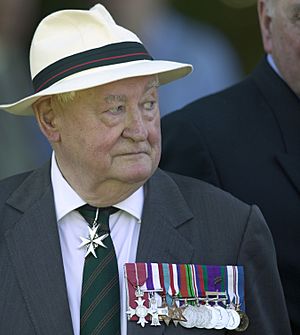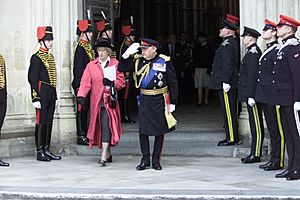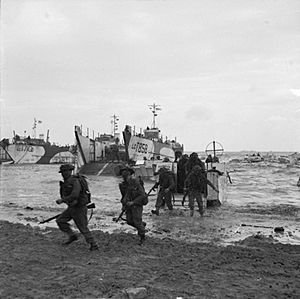Edwin Bramall facts for kids
Quick facts for kids
The Lord Bramall
|
|
|---|---|

Field Marshal Bramall, pictured here in 2005.
|
|
| Birth name | Edwin Noel Westby Bramall |
| Born | 18 December 1923 Tonbridge, Kent, England |
| Died | 12 November 2019 (aged 95) |
| Allegiance | United Kingdom |
| Service/ |
British Army |
| Years of service | 1942–1985 |
| Rank | Field Marshal |
| Service number | 277408 |
| Unit | King's Royal Rifle Corps Royal Green Jackets |
| Commands held | Chief of the Defence Staff Chief of the General Staff Land Forces British Forces in Hong Kong 1st Division 5th (Airportable) Infantry Brigade 2nd Battalion Royal Green Jackets |
| Battles/wars | Second World War Indonesia–Malaysia confrontation Falklands War |
| Awards | Knight of the Order of the Garter Knight Grand Cross of the Order of the Bath Officer of the Order of the British Empire Military Cross Knight of the Order of St John Mentioned in despatches |
Field Marshal Edwin Noel Westby Bramall, Baron Bramall (born 18 December 1923 – died 12 November 2019) was an important officer in the British Army. He held two very high positions: Chief of the General Staff from 1979 to 1982, and Chief of the Defence Staff from 1982 to 1985. These roles meant he was the professional head of the British Army and then the entire British Armed Forces.
Contents
Early Life and Family
Edwin Noel Westby Bramall was born on 18 December 1923. His birthplace was Tonbridge, a town in Kent, England. His father was Major Edmund Haselden Bramall. Edwin went to a famous school called Eton College.
In 1949, he married Dorothy Avril Wentworth Vernon. They had a son and a daughter together. His older brother, Ashley Bramall, became a barrister and a Labour politician. Ashley was also a leader in the Inner London Education Authority.
Military Career Highlights
Bramall began his military journey during the Second World War. He became a second lieutenant in the King's Royal Rifle Corps in May 1943. He was part of the Normandy landings in June 1944. These landings were a huge and important invasion during the war. He served in Northwest Europe and earned the Military Cross in March 1945. This award is given for bravery in battle.
After the war, Bramall continued his service. He was promoted to lieutenant in 1946. He worked in the occupation of Japan for a time. Later, he became an instructor at the School of Infantry in 1949. He rose through the ranks, becoming a captain in 1950 and a major in 1957. He also taught at the Staff College, Camberley. In 1963, he joined the staff of Lord Mountbatten, a very senior military leader.
Leading Troops and High Commands
In 1965, Bramall was recognized with the Officer of the Order of the British Empire award. He became a lieutenant colonel and led the 2nd Green Jackets. This battalion was sent to Borneo during the Indonesia–Malaysia confrontation in 1966. His actions there were noted, and he received a mention in despatches. This means his bravery was officially recognized.
He then commanded the 5th (Airportable) Infantry Brigade. He was promoted to brigadier in 1967. His career continued to advance quickly. In 1972, he became the General Officer Commanding the 1st Division. He was promoted to major general.
Bramall was appointed Commander British Forces in Hong Kong in 1973. He became a lieutenant general. He received another honor, being made a Knight Commander of the Order of the Bath. In 1976, he became Commander-in-Chief, UK Land Forces. He was promoted to a full general.

In 1978, he became Vice-Chief of the Defence Staff. He was further honored as a Knight Grand Cross of the Order of the Bath in 1979. He was also made ADC General to the Queen. On 14 July 1979, he became Chief of the General Staff. This role made him the professional head of the British Army. During the Falklands War in 1982, he strongly supported the plan to land troops at San Carlos Water.
Bramall reached the highest rank, field marshal, on 1 August 1982. He was then appointed Chief of the Defence Staff. This made him the professional head of all British Armed Forces. He retired from military service in November 1985.
Life After the Military
After retiring from the army, Lord Bramall continued to serve his country. He became the Lord Lieutenant of Greater London from 1986 to 1998. A Lord Lieutenant is the Queen's personal representative in a county.
In 1987, he was made a life peer. This meant he became Baron Bramall of Bushfield. This title allowed him to sit in the House of Lords. The House of Lords is part of the UK Parliament. He used his position to speak about important issues. For example, he shared his views on military actions.
In 1990, he received a very special honor. He was invested as a Knight of the Garter. This is one of the oldest and most important orders of chivalry in the world. He was also President of the Marylebone Cricket Club (MCC) in 1988. The MCC is a very famous cricket club. He enjoyed painting and travel. He also supported SSAFA Forces Help, a charity that helps military families.
Lord Bramall retired from the House of Lords on 25 April 2013. He passed away at the age of 95 on 12 November 2019.
Images for kids
 | Lonnie Johnson |
 | Granville Woods |
 | Lewis Howard Latimer |
 | James West |



